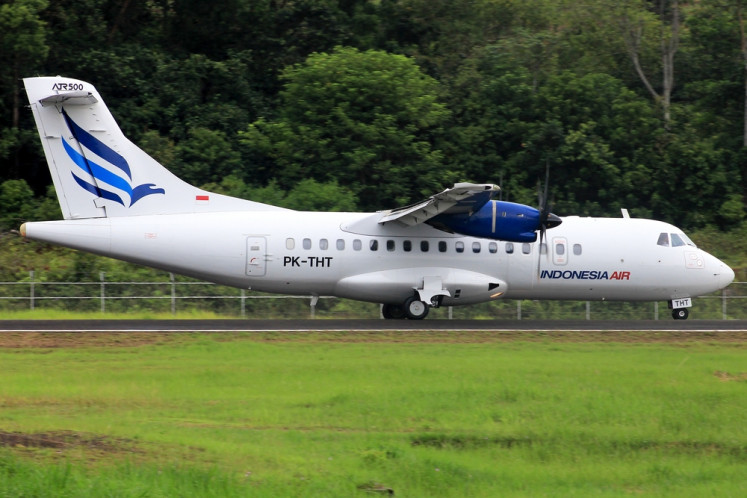Popular Reads
Top Results
Can't find what you're looking for?
View all search resultsPopular Reads
Top Results
Can't find what you're looking for?
View all search resultsJakarta Symphony Orchestra returns
Jan
Change text size
Gift Premium Articles
to Anyone
J
an. 27, 2010 was a very significant moment in the life of the Jakarta Symphony Orchestra, when it staged a comeback after a fairly long absence.
Beginning as an amateur group called "Bataviasche Philharmonic Orchestra" in Dutch Colonial times, it turned into the NIROM orchestra, as soon as the radio broadcasting station Nederlandsch-Indische Radio Omroep Maatschappij was born in 1912.
The Jakarta Symphony Orchestra has existed in the country's musical world for almost a century through its changing formats to suit prevailing trends and needs. In 1950, a merger of the Cosmopolitan Orchestra under Joel Cleber and the Jakarta Studio Orchestra under Sutedjo and Iskandar appeared as the Djakarta Radio Orchestra under Henkie Strake for classical repertoires, and the Jakarta Studio Orchestra led by Syaiful Bachri specialized in Indonesian pieces.
The Jakarta Studio Orchestra played an important role as an effective means of Indonesian musical development. One of its historic programs, still organized up to the present, is the Radio Star contest, although it has had to struggle for continuity amid the global wave of more prestigious, widespread and marketable categories of industrial music.
In fact, symphony orchestral music is nothing new to Indonesia, as the long Dutch presence in the country considerably influenced the growth of local music as well as the public appreciation of various musical categories.
Through generations, Indonesians have been familiar with Western music including pop, chamber and orchestral music, besides local keroncong (of Portuguese origin). This familiarity has now been enhanced by the national radio broadcasting service Radio Republik Indonesia (RRI) and the national TV station Televisi Republik Indonesia (TVRI) through their programs.
Major cities like Jakarta, Bandung, Yogyakarta and Surabaya are no strangers to orchestral music, with their own symphony groups. Jakarta, for instance, has its Nusantara Symphony Orchestra, the Twilight Orchestra and the Jakarta Chamber Orchestra. Yogyakarta once boasted its Indonesian Wind Orchestra (IWO), which finally disappeared, and has big bands coming and going one after another.
Ideally, Indonesia with a population of more than 200 million should maintain quite a lot of symphony orchestras to present varied and innovative concerts with musical repertoires ranging from traditional to modern pieces. The presence of these orchestras, however, is inseparable from the country's musical education.
Formal and informal music schools, studios and courses have been mushrooming lately. Yet musical education of good quality is not a simple matter, let alone the tendency of achieving commercial ends without proper regard to the obligation to turn out competent graduates.
Meanwhile, the musical talent found among Indonesians requires the support of good education, discipline in training as well as knowledge of musical theory and art. Prospective musicians should therefore be committed and highly dedicated while avoiding complacency.
Undeniably, the Jakarta Symphony Orchestra from RRI has laid down a solid foundation to face the rush of modernization in Indonesia's orchestral sphere.
Through senior musicians like Fauzan (alto violin), Suryati Supilin (violin), Yudianto (oboe, clarinet, flute), Tonny Suwandi (saxophone, trombone), Amir Katamsi (contrabass), successors are being forged to pursue their professional career.
The heyday of the Jakarta Symphony Orchestra was thanks to the role of senior conductors like Adi Dharma, Praharyawan Prabowo and Yudianto, whose serious direction has been carried on by Amir Katamsi, recently in command of the Jakarta Symphony Orchestra's concert to mark the opening of the RRI auditorium in honor of the late M.Jusuf Ronodipuro, one of the founders of RRI.
The orchestra's performance brought a breath of fresh air to standard classical works such as Mozart's Symphony No.40 K.550 in G-minor and Eine Kleine Nachtmusik in a harmonious dialogue style, Bach's Air on G string in a melancholic yet expressive melody, and Strauss's Tritsch-tratsch Polka and Blue Da-nube with a jovial tune, inviting spontaneous clapping.
The Prayer by David Foster, Amigos Para Siempre by Lloyd Webber and Time to say goodbye by Francesco Sartori, sung by Indonesia's famous soprano Aning Katamsi and tenor Christopher Abimanyu, produced a romantic atmosphere, whereas Lagu untuk Anakku (A song for my child) by Syaiful Bachri, Karam (Sunken) by Iskandar and Cintaku Jauh di Pulau (My love on the island) by F.X. Sutopo gave a distinctive Indonesian color.
Now, with its philharmonic instruments resuming their musical beauty, the Jakarta Symphony Orchestra should keep its concerts resounding by staging great songs and classical masterpieces of the world. Friendship and harmony should be created through its exquisite symphonic tones.
The voice of RRI should also be reverberating on the air along with the Jakarta Symphony Orchestra. A lot more Indonesian musicians and their works are awaiting their moment to be aired.
The motto of RRI, as first declared by M. Jusuf Ronodipuro, "On the air, once and forever", should inspire this orchestra's future creations in continuing its journey after the long break.
The writer is a pianist and cultural observer.










